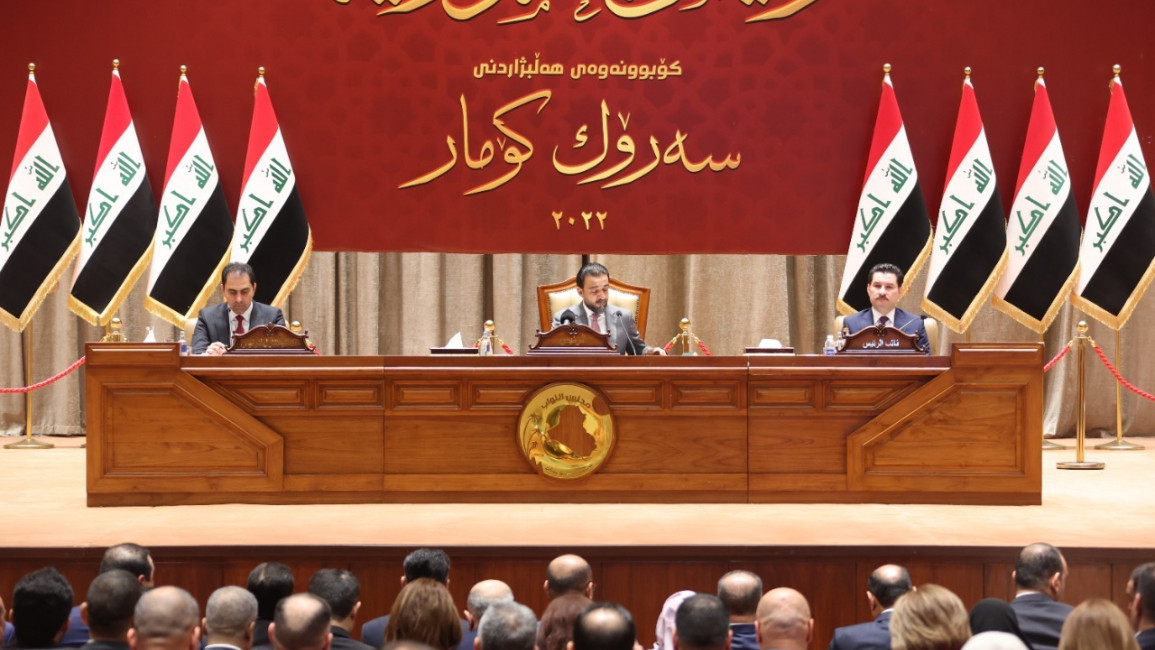Iraqi parliament set to elect new parliament speaker despite political disputes
Amidst ongoing political discord, the Iraqi parliament designated this Saturday, 27 January, as the day to elect a new speaker, underscoring the process's challenges and tensions.
Previously, the Iraq parliament failed to elect a new speaker after Iraq's top court on 14 November ousted Mohammed al-Halbousi, the parliament speaker at the time, following his conviction of forgery of official records related to the resignation letter of one of the MPs.
The parliament has so far failed in three sessions to elect a new speaker, the latest of which was on the 13th of this month, in which Shalan al-Karim, the candidate of al-Halbousi's Progress Party, received only 152 votes- a figure that does not represent the absolute majority that qualifies him to win the position.
According to the Iraqi constitution, the candidate for the position of parliament speaker must secure an absolute majority, surpassing 165 votes out of 329 lawmakers.
The Coordination Framework (CF), an alliance of Iran-backed Shia blocs that holds a majority in the parliament, raised questions over the last session and its legitimacy and accused al-Halbousi's alliance of offering bribes to deputies to vote for its candidate, Shalan al-Karim.
This past Tuesday, the parliament decided to investigate the allegations, a step that could further complicate the ongoing crisis of selecting a new speaker for the parliament.
So far, the Progress Party has not presented any other candidates besides al-Karim. "Any agreement on a single candidate for the position does not exist so far," a member from Halbousi's party told Al-Arabi Al-Jadeed, The New Arab's Arabic sister language, on condition of anonymity.
He also added that the Progress Party will meet to discuss the file before Saturday's session and determine its options, indicating that Karim remains their candidate for the position.
At a time when most leaders of the Coordination Framework Alliance have objections to the nomination of Karim, Jasim al-Mousawi, an MP from the Nuri al-Maliki's State of Law Coalition, said, "There is an objection to the nomination of Shalan al-Karim, and he will be excluded by electing competitors."
On Wednesday, he clarified, "The competition will be between Salem al-Issawi and Mahmoud al-Mashhadani exclusively."
"The competition remains between the candidates with the highest votes, Issawi and Mashhadani, while the one who decides to choose the next Speaker of Parliament is the forces of the Coordination Framework," he added.
Iraq has an ethnic and sectarian power-sharing system where the speaker of parliament is usually a Sunni Arab. At the same time, the prime minister is a Shia Arab, and the president is Kurdish.
Al-Mashhadani,74, had served as the speaker of the Iraqi Parliament from 2006 to 2009. He was forced to resign after being accused of "rude behaviour" towards deputies.
Al-Mashhadani, on 29 November, exclusively told The New Arab that he is the only candidate for virtually all Sunni blocs in the election for a new speaker inside the parliament.
Mashhadani enjoys strong relations with Iraq's powerful Shia politician and ex-prime minister, Nouri al-Maliki, who in turn is close with Iran.
The Determination Alliance, led by Sunni politician Muthanna al-Samarrai, nominated al-Mashhadani for the position. Meanwhile, the Sovereignty Party, the most prominent Sunni Arab political force, nominated al-Issawi, who also received broad support from various parliamentary forces.
In the last session, Karim received 152 votes, with Issawi coming in second with 97 votes, followed by Mashhadani with 48.
The federal court's decision followed a legal action initiated by Laith al-Dulaimi, another Sunni parliamentarian, who accused Halbousi of forging his resignation letter.



